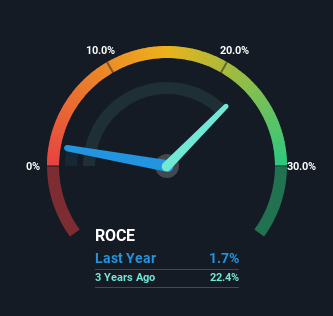- Hong Kong
- /
- Basic Materials
- /
- SEHK:1847
The Returns On Capital At YCIH Green High-Performance Concrete (HKG:1847) Don't Inspire Confidence
Finding a business that has the potential to grow substantially is not easy, but it is possible if we look at a few key financial metrics. Ideally, a business will show two trends; firstly a growing return on capital employed (ROCE) and secondly, an increasing amount of capital employed. If you see this, it typically means it's a company with a great business model and plenty of profitable reinvestment opportunities. Having said that, from a first glance at YCIH Green High-Performance Concrete (HKG:1847) we aren't jumping out of our chairs at how returns are trending, but let's have a deeper look.
Return On Capital Employed (ROCE): What Is It?
For those that aren't sure what ROCE is, it measures the amount of pre-tax profits a company can generate from the capital employed in its business. The formula for this calculation on YCIH Green High-Performance Concrete is:
Return on Capital Employed = Earnings Before Interest and Tax (EBIT) ÷ (Total Assets - Current Liabilities)
0.017 = CN¥24m ÷ (CN¥4.8b - CN¥3.4b) (Based on the trailing twelve months to June 2023).
So, YCIH Green High-Performance Concrete has an ROCE of 1.7%. In absolute terms, that's a low return and it also under-performs the Basic Materials industry average of 3.5%.
Check out our latest analysis for YCIH Green High-Performance Concrete

Historical performance is a great place to start when researching a stock so above you can see the gauge for YCIH Green High-Performance Concrete's ROCE against it's prior returns. If you'd like to look at how YCIH Green High-Performance Concrete has performed in the past in other metrics, you can view this free graph of YCIH Green High-Performance Concrete's past earnings, revenue and cash flow.
The Trend Of ROCE
When we looked at the ROCE trend at YCIH Green High-Performance Concrete, we didn't gain much confidence. Over the last five years, returns on capital have decreased to 1.7% from 28% five years ago. Given the business is employing more capital while revenue has slipped, this is a bit concerning. This could mean that the business is losing its competitive advantage or market share, because while more money is being put into ventures, it's actually producing a lower return - "less bang for their buck" per se.
On a separate but related note, it's important to know that YCIH Green High-Performance Concrete has a current liabilities to total assets ratio of 71%, which we'd consider pretty high. This can bring about some risks because the company is basically operating with a rather large reliance on its suppliers or other sorts of short-term creditors. While it's not necessarily a bad thing, it can be beneficial if this ratio is lower.
The Bottom Line On YCIH Green High-Performance Concrete's ROCE
We're a bit apprehensive about YCIH Green High-Performance Concrete because despite more capital being deployed in the business, returns on that capital and sales have both fallen. We expect this has contributed to the stock plummeting 76% during the last three years. With underlying trends that aren't great in these areas, we'd consider looking elsewhere.
If you want to know some of the risks facing YCIH Green High-Performance Concrete we've found 3 warning signs (2 are a bit concerning!) that you should be aware of before investing here.
While YCIH Green High-Performance Concrete isn't earning the highest return, check out this free list of companies that are earning high returns on equity with solid balance sheets.
New: Manage All Your Stock Portfolios in One Place
We've created the ultimate portfolio companion for stock investors, and it's free.
• Connect an unlimited number of Portfolios and see your total in one currency
• Be alerted to new Warning Signs or Risks via email or mobile
• Track the Fair Value of your stocks
Have feedback on this article? Concerned about the content? Get in touch with us directly. Alternatively, email editorial-team (at) simplywallst.com.
This article by Simply Wall St is general in nature. We provide commentary based on historical data and analyst forecasts only using an unbiased methodology and our articles are not intended to be financial advice. It does not constitute a recommendation to buy or sell any stock, and does not take account of your objectives, or your financial situation. We aim to bring you long-term focused analysis driven by fundamental data. Note that our analysis may not factor in the latest price-sensitive company announcements or qualitative material. Simply Wall St has no position in any stocks mentioned.
About SEHK:1847
YCIH Green High-Performance Concrete
Operates as a ready-mixed concrete producer in the People's Republic of China.
Mediocre balance sheet and slightly overvalued.
Market Insights
Community Narratives




